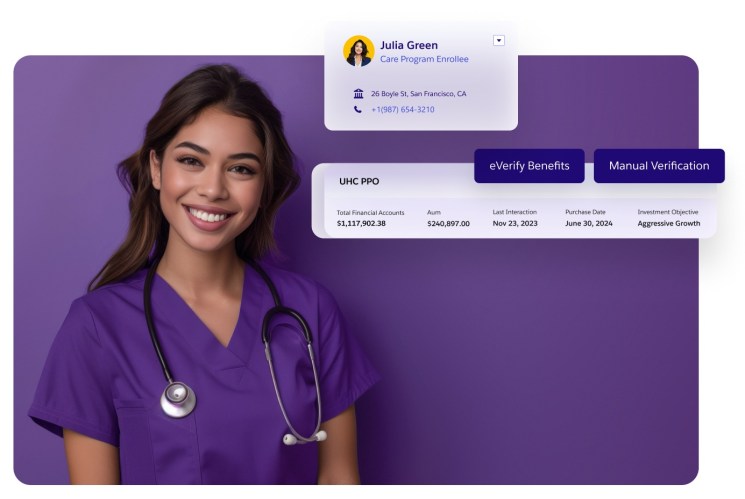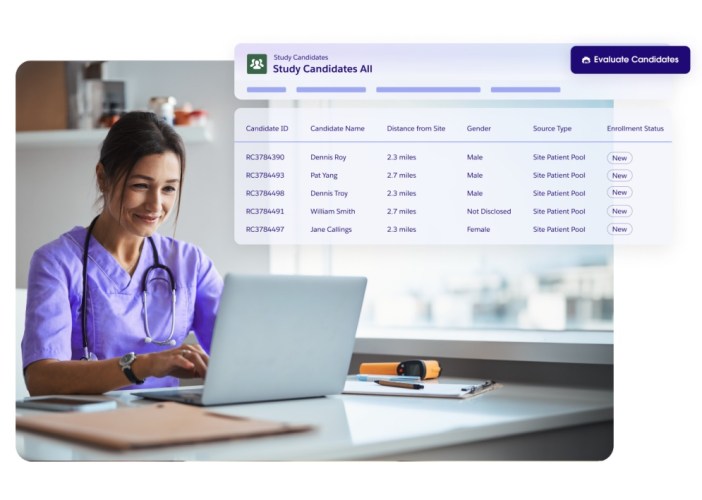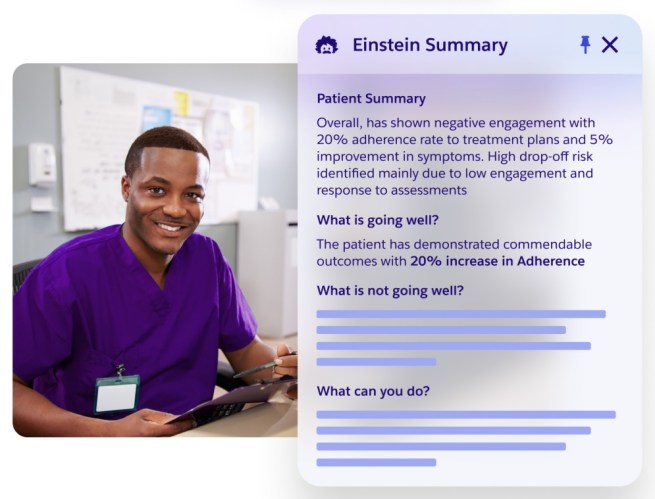3 Ways Life Sciences Organizations Can Use AI Today



With AI for life sciences, Pharma and MedTech companies can improve efficiency and better support patients and healthcare professionals.
Artificial intelligence (AI) for life sciences has the potential to help your organization make better decisions by integrating into daily workflows for healthier businesses and better outcomes. From process automation and predictive intelligence to generative and agentic AI, an industry-specific AI-powered CRM platform can provide the essential tools for Pharma and MedTech companies to easily set up and use reliable AI solutions.
By scaling services to deliver life-enhancing therapies to patients faster, AI for life sciences can help Pharma and MedTech companies boost efficiency and better support patients and healthcare professionals (HCPs) whether it’s during clinical trials or staying connected with patients to help improve treatment adherence.
AI for life sciences offers three practical use cases you can adopt today:
- Improved clinical trial recruitment and study conduct that can accelerate drug development.
- Time savings for sales reps with automation and proactive notifications that can increase HCP interactions.
- More effective patient support programs that can spur faster time to therapy and improved patient outcomes.
1. Improved clinical trial recruitment and study conduct
Life Sciences organizations face increasing competition to enroll clinical trial participants. This is because the volume of clinical trials is growing, but the growth of the participant pool is not. Much of that is due to not being able to identify the right candidates or keep the ones they do find engaged. In fact, 80% of clinical trials fail to meet participant enrollment targets, and most eligible candidates don’t even know about the trials they qualify for. Enrollment still happens manually on a trial by trial basis, resulting in slower time to market.
AI for life sciences can improve clinical trial recruitment and segmentation. Your clinical and research and development teams can take advantage of generative AI to intelligently and more accurately match prospective trial participants to eligible trials. Identifying and targeting eligible participants faster can reduce trial costs, help meet trial enrollment rates, and limit dropout — factors that together can accelerate drug development. Eventually, clinical trial teams will be able to take advantage of autonomous agents to help them further speed up the time to trial.
Further, agentic AI can help you streamline the process of determining optimal sites that are most likely to yield success for a clinical trial. Agents can analyze combined historical healthcare information, geographic data, and past site performance data to determine the sites with the highest likelihood of success.
Similarly, you can use data and generative AI to author clinical business cases that you can use to support investment decisions. Once you have secured funding to run a study, you can use predictive AI to pool scientific data, patient population data, market data, and prescribing data to design a clinical study.
2. Time savings for sales reps with automation and proactive notifications
AI for life sciences can help your sales reps save significant time and effort with AI-powered inventory agents that send automated notifications about product shortages. These agents not only alert reps to potential stock shortages but also suggest solutions like transferring devices from another rep’s inventory. This proactive approach helps ensure timely deliveries and minimizes delays in therapy, all while reps are on the go. AI can also enable compliance, such as using built-in guardrails and triggers to prevent prescription sampling beyond the regulated allotment.
Automating the creation of tailored and secure medical sales emails can streamline communication with stakeholders such as hospitals, clinics, and physicians. Whether it’s notifying them about new rebates, creating contract quotes, or following up on a sales visit, this automation frees up valuable time sales reps typically spend finding information to instead focus on other critical tasks. Using an assistive agent, reps can ask, “Who are my HCPs with declining procedures over the past 6 months?” or “Which content and key messaging should I be using for this call?” to prepare for meetings with healthcare professionals.
3. More effective patient support programs
Patient services in life sciences encompasses key access and support services to patients who are currently using a commercially-available product. They are intended to ensure patients can gain access to medication in a timely fashion and achieve the best possible clinical outcome and improve adherence to the prescribed therapies.
Assistive agents can help out busy patient services case managers by taking on administrative tasks like sending an email or generating a call script to collect insurance coverage information, out-of-pocket cost details, and missing patient information to prevent any delays to treatment. Autonomous agents can send proactive alerts to patient services teams if there are any potential delays that might result in delayed access to therapy and optimize scheduling for personalized medicine delivery, ensuring best possible use of manufacturing slots and clinical outcomes for the patient.
Embrace the possibilities of today’s technology
AI for life sciences is transforming the industry landscape, offering powerful solutions that increase efficiency and enhance patient outcomes. By embedding AI into your operations, Pharma and MedTech companies can tackle some of the most pressing challenges and deliver better outcomes for patients.
But this is just the beginning. As AI continues to evolve, its potential to enhance efficiency, improve outcomes, and create a more patient-centric healthcare ecosystem is immense. The question isn’t whether AI will change life sciences, but how quickly the industry can embrace its possibilities.
Meet Life Sciences Cloud
Discover how our compliant, Agentforce-powered platform can help you get life-enhancing therapies and devices to patients, faster.


























![[Illustration] An AI agent helps a customer service rep solve cases.](https://www.salesforce.com/blog/wp-content/uploads/sites/2/2025/06/Agentforce-for-Service-Relaunch-1500x844-1.jpg?w=128&h=96&crop=1&quality=75)




